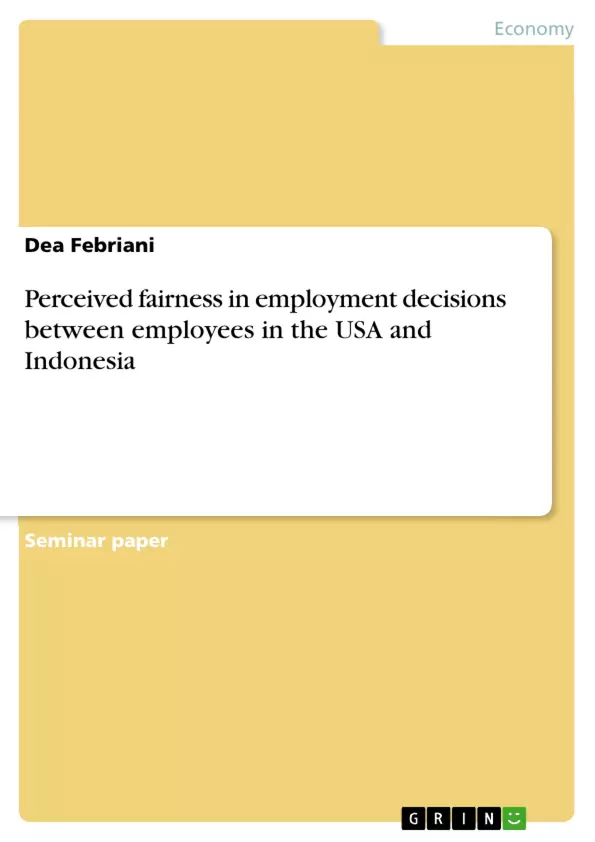Employment decisions are critical parts of human resource (HR) practices in an organization. They have a powerful impact on the organization, as well as to the employees or applicants. As a significant part of making an employment decision, perceived fairness has grabbed an enormous attention of researchers due to its significant impacts. In attempt to increase more understanding about perceived fairness in employment decisions and how they affect the employees and the organization both in western and eastern context, this article will review some literatures and compare specifically between employees and organizations in the USA and Indonesia, two countries with a contrast characteristics and culture, yet play such important roles in the world’s economic growth.
Inhaltsverzeichnis (Table of Contents)
- Introduction
- What is an employment decision and what are the impacts?
- What are the Influencing Factors in Employment Decisions?
- The Influence of Cultural Differences in Employment Decisions
- Hofstede's Cultural Differences Theory
- Job Satisfaction and Organizational Performance in Different Culture
- Decision Making Across Culture
- Cultural profile differences between the USA and Indonesia
- The Influence of Law in Employment Decisions
- Law Employment in Indonesia
- Law Employment in The USA
- Comparison Between HR Practices in The USA and Indonesia
- Recruitment and Selection
- Performance Management
- Organizational Change
- Conclusion
Zielsetzung und Themenschwerpunkte (Objectives and Key Themes)
This article examines the concept of perceived fairness in employment decisions and its implications for both employees and organizations. It aims to provide a comprehensive review of existing literature and compare the concept between employees and organizations in the USA and Indonesia, two countries with contrasting cultural and legal environments.
- The significance of employment decisions in HR practices.
- The impact of perceived fairness in employment decisions on employee attitudes and behaviors.
- The influence of cultural differences on perceptions of fairness in employment decisions.
- The role of legal frameworks in shaping employment practices and decisions.
- A comparative analysis of HR practices, including recruitment, performance management, and organizational change, in the USA and Indonesia.
Zusammenfassung der Kapitel (Chapter Summaries)
- Introduction: This chapter introduces the concept of employment decisions and their importance in organizational settings. It highlights the significance of perceived fairness in employment decisions and its potential impact on employee attitudes, behaviors, and organizational outcomes. It also emphasizes the need to understand the cultural and legal contexts surrounding fairness in different countries.
- What is an employment decision and what are the impacts?: This chapter delves into the definition of employment decisions and explores their various impacts on organizations and employees. It discusses the different types of employment decisions, including hiring, compensation, performance evaluation, promotion, and termination, and analyzes their potential consequences for individuals and organizations.
- What are the Influencing Factors in Employment Decisions?: This chapter examines the key factors that influence employment decisions within organizations. It explores how organizational size, goals, orientation, culture, and legal regulations can shape decision-making processes and outcomes.
- The Influence of Cultural Differences in Employment Decisions: This chapter examines the role of cultural differences in shaping perceptions of fairness in employment decisions. It focuses on Hofstede's Cultural Differences Theory and its application to understanding cultural variations in employment decision-making. It also discusses the implications of cultural differences for job satisfaction, organizational performance, and decision-making practices.
- The Influence of Law in Employment Decisions: This chapter analyzes the legal frameworks governing employment decisions in both Indonesia and the USA. It explores the specific laws and regulations related to employment practices and their impact on the perception of fairness in employment decisions.
- Comparison Between HR Practices in The USA and Indonesia: This chapter compares HR practices, including recruitment and selection, performance management, and organizational change, in the USA and Indonesia. It examines the potential differences in these practices and how they contribute to varying perceptions of fairness in employment decisions across these two countries.
Schlüsselwörter (Keywords)
This article focuses on the critical concepts of perceived fairness, employment decisions, cultural differences, legal frameworks, HR practices, employee attitudes, organizational performance, and the comparative analysis of the USA and Indonesia.
- Quote paper
- Dea Febriani (Author), 2017, Perceived fairness in employment decisions between employees in the USA and Indonesia, Munich, GRIN Verlag, https://www.grin.com/document/385520



